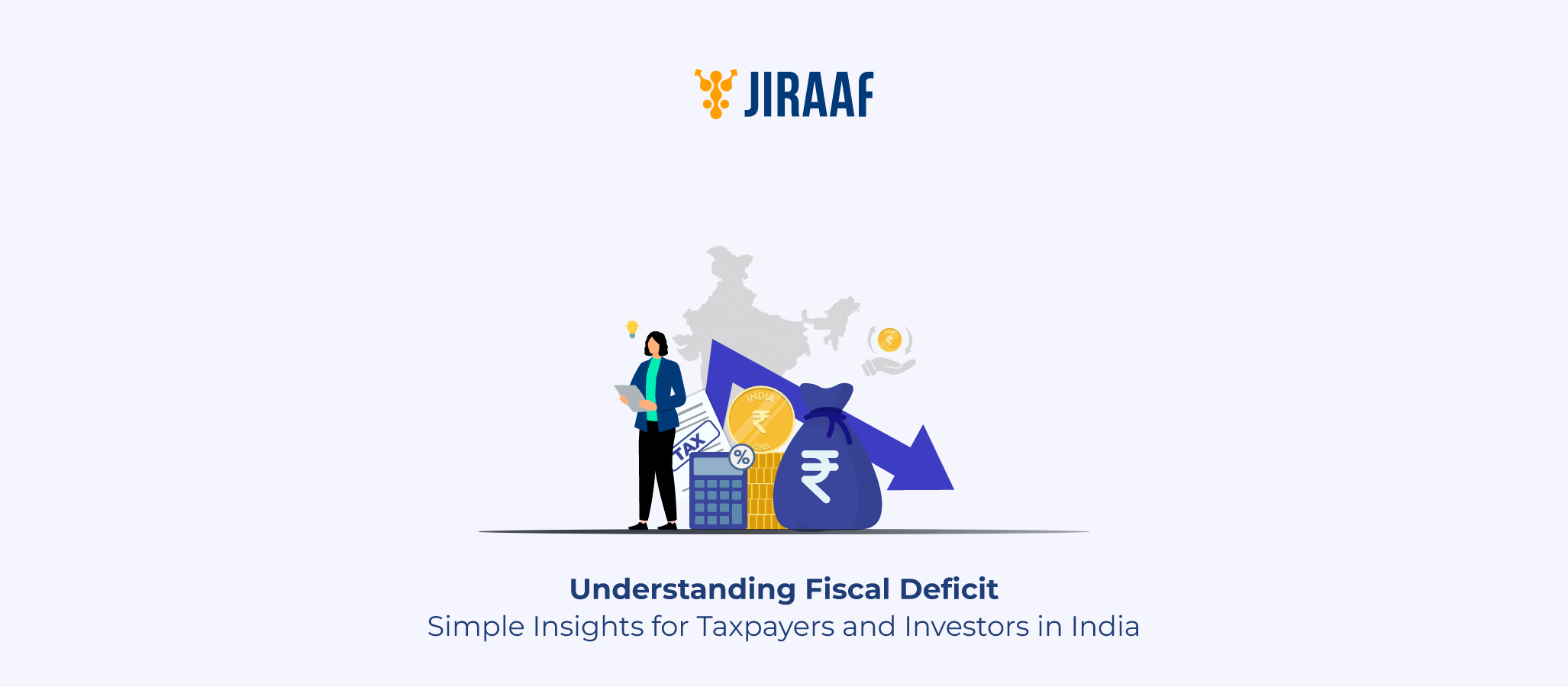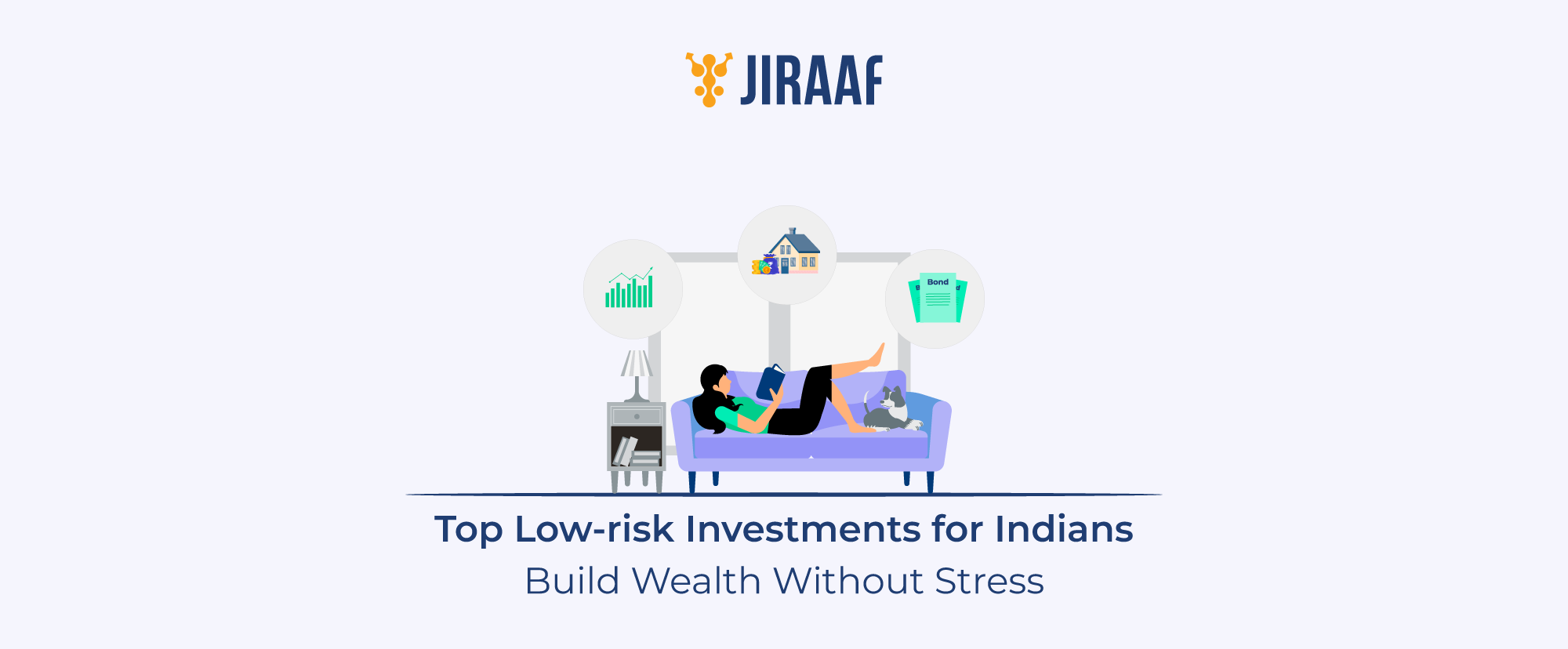The fiscal deficit is the figure that frequently makes headlines when the Union Budget is released each year. Despite its abstract economic meaning, it has a direct impact on inflation, national GDP, and even your personal financial situation. To put it simply, a fiscal deficit occurs when government expenditure exceeds its total revenue, excluding borrowings. Running a deficit can finance development, welfare, and infrastructure, so it’s not always a bad thing, but a persistently high budget deficit can put pressure on the economy. In addition to raising interest rates and pushing the government to borrow more, it also runs the danger of causing inflation.
It is crucial to decode India’s fiscal deficit number as millions rely on governmental programs, subsidies, and employment development. In this blog, we’ll break down what fiscal deficit means, how it is calculated, and why it matters for the Indian economy—and ultimately, for you as a taxpayer, or investor.
What is Fiscal Deficit?
A fiscal deficit refers to the difference between a government’s total expenditure and its total revenue, excluding any borrowings. This metric serves as a crucial indicator of a nation’s financial stability, reflecting the extent to which borrowing is necessary to cover expenses. When maintained at reasonable levels, a fiscal deficit can be perceived positively, as it often indicates investment in infrastructure, social welfare, and development initiatives. Conversely, an excessively large deficit is typically regarded as a red flag, signaling potential increases in national debt and future tax liabilities.
Imagine the government earns ₹100 through taxes and other income but needs to spend ₹120 on roads, healthcare, defense, and welfare schemes. The ₹20 gap is the fiscal deficit, which the government covers by borrowing money. That’s how it works in simple terms.
Let’s see how economists calculate the fiscal deficit.
How is Fiscal Deficit Calculated?
The difference between the government’s real revenue and expenditures is known as the fiscal deficit. Spending more than the national income results in a deficit, which must be offset by borrowing.
Simple Formula
Fiscal Deficit = Government Expenditure – Government Income
Where,
- Government expenditure includes expenses on sectors like infrastructure, defense, subsidies, salaries, and welfare schemes.
- Government income that comes mainly from taxes, duties, fees, disinvestment, and loan recoveries.
Official Formula (as used in budgets)
Fiscal Deficit = Total Expenditure – (Revenue Receipts + Non-debt Capital Receipts)
Where,
- Total expenditure includes spending on infrastructure, defense, subsidies, salaries, and welfare schemes.
- Revenue receipts are regular governmental earnings like taxes, duties, and fees.
- Non-debt capital receipts include funds obtained through disinvestment and loan recoveries, but do not include debt recovery, which is a debt transaction itself.
Assume, for instance, that the government spends ₹100 lakh crore annually. Taxes and other revenues bring in ₹80 lakh crore, while loan recoveries and disinvestment bring in ₹5 lakh crore. ₹85 lakh crore is the total amount of non-borrowed income. The fiscal deficit, which must be funded through borrowing, is the remaining ₹15 lakh crore.
What is Revenue Deficit?
A revenue shortfall occurs when the government’s revenue expenditures exceed its revenue receipts. Simply said, it demonstrates that the government does not collect enough regular money (such as taxes and fees) to meet its day-to-day expenses, such as salaries, pensions, subsidies, and interest payments.
Now that we know what both fiscal deficit and revenue deficit mean, let’s compare them side by side to see how they differ.
Fiscal Deficit vs. Revenue Deficit
Fiscal deficit happens when the government’s overall spending surpasses its revenue (excluding borrowings), whereas a revenue deficit occurs when the government’s regular revenue (such as taxes and fees) is insufficient to pay for its ongoing costs (such as interest payments, subsidies, and salaries). Let’s see some more differences.
| Aspect | Fiscal Deficit | Revenue Deficit |
| Meaning | Gap between total expenditure and total income (excluding borrowings). | Gap between revenue expenditure and revenue income. |
| Includes | Revenue + capital expenditure. | Only revenue (day-to-day) expenditure. |
| Focus | Shows total borrowing needs of the government. | Shows shortfall in regular income for routine expenses. |
| Impact | Affects overall debt, inflation, and growth. | Signals inefficiency in managing current income vs expenses. |
| Example | Govt. earns ₹100, spends ₹120 → Fiscal deficit = ₹20. | Govt. earns ₹100, spends ₹110 only on salaries, pensions, subsidies → Revenue deficit = ₹10. |
Understanding deficits is one thing, but knowing why a fiscal deficit matters for growth, inflation, and borrowing is where it really counts.
Why Does Fiscal Deficit Matter for National Economy?
A fiscal deficit is significant because it demonstrates the extent to which a government must borrow money to cover its costs. Inflation, interest rates, and private company funding can all rise when the deficit is large. A controlled deficit scenario, on the other hand, can promote growth by financing welfare, infrastructure, and employment.
By FY 2025–26, the Government of India aims to bring the fiscal deficit down to about 4.4% of GDP. This is slightly lower than the earlier target of under 4.5% and the revised estimate of 4.8% for FY 2024–25, showing a push toward fiscal discipline despite economic pressures. In FY 2023–24, the deficit stood at around 5.8% of GDP, underlining the challenges faced. Looking ahead, the government plans to balance growth-oriented spending with tighter control on borrowing, and from FY 2026–27, it will use the debt-to-GDP ratio as its main fiscal guide.
Here’s how a high fiscal deficit can ripple through inflation and loans for everyone
Fiscal Deficit and Its Impact on Inflation & Borrowing
Inflation and borrowing rates are two of the many ways that a budget deficit impacts the economy. The demand for money rises when the government takes on significant debt to make up for a deficit. Interest rates may rise as a result, increasing the cost of loans for both individuals and enterprises. Additionally, increased borrowing puts more strain on the central bank, which may hike interest rates in an effort to regulate inflation.
Inflation can be caused by a significant fiscal deficit. Prices typically grow when more money is injected into the system without a corresponding rise in goods and services. Citizens’ purchasing power is diminished, and the cost of necessities may increase as a result.
Example: A government is forced to borrow more from the market when its expenses continuously exceed its revenue. This additional borrowing may result in higher interest rates, less money available for private companies, and possibly higher pricing for goods and services.
From inflation to investments, here’s why fiscal deficit matters to you.
Final Thoughts: What Fiscal Deficit Means for You as a Taxpayer & Investor
Every citizen is impacted by the fiscal deficit, which makes it more than just a number in the annual budget.
If you are a taxpayer, a large budget deficit frequently indicates that further borrowing is required to cover government spending. This may result in future tax increases or reductions in subsidies, since money must be raised to pay off debt. Increased inflation could also lower the purchasing power of your savings, pensions, and salaries.
If you are an investor, you may see returns on government bonds and other fixed-income securities impacted by the fiscal deficit. As more government borrowing may result in less financing available for private enterprises to expand, it may also have an indirect impact on stock markets.
India’s economic stability depends on careful fiscal deficit management. When managed properly, it benefits investors and taxpayers by promoting social programs, infrastructure, and growth. On the other hand, an uncontrolled deficit may result in slower economic growth, greater taxes, and lower savings returns.
People can better relate government spending decisions to their own financial situation and investment decisions when they are aware of the fiscal deficit.









